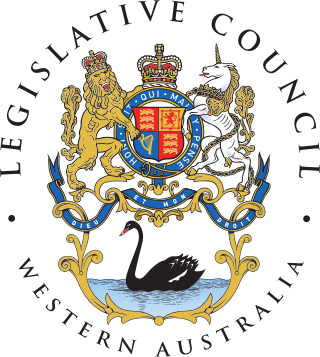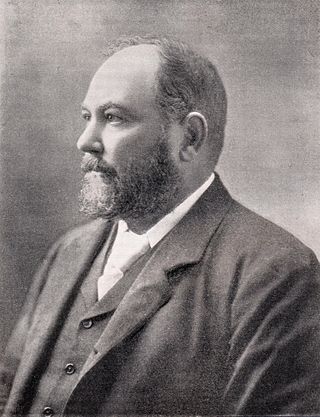Related Research Articles

Sandy Bay is a suburb of the city of Hobart, Tasmania, Australia, located immediately south of the central business district, and adjoining the suburb of Battery Point. Sandy Bay is bounded on the east by the Derwent River, and has several beaches along the shore, the main beaches with public access are Short Beach, Nutgrove Beach, Long Beach and Lords Beach.

The Western Australian Legislative Council is the upper house of the Parliament of Western Australia, a state of Australia. It is regarded as a house of review for legislation passed by the Legislative Assembly, the lower house. The two Houses of Parliament sit in Parliament House in the state capital, Perth.

The electoral district of Pilbara is a Legislative Assembly electorate in the state of Western Australia. Pilbara is named for the region of Western Australia in which it is located. It is one of the oldest electorates in Western Australia, with its first member having been elected to the Second Parliament of the Legislative Assembly at the 1894 elections.
This is a list of members of the Western Australian Legislative Council from October 1870 to June 1872. The chamber had 18 members, as specified by the Legislative Council Act 1870. Section 1 of this Act specified that a minimum of one-third of the Council would be appointed by the Crown. Three of these were official nominees who were part of the Continuous Ministry—namely the Colonial Secretary, Attorney-General and the Surveyor-General—while the remaining three were "non-official nominees".
This is a list of members of the Western Australian Legislative Council from June 1872 to September 1874. The chamber had 18 members, as specified by the Legislative Council Act 1870. Section 1 of this Act specified that a minimum of one-third of the Council would be appointed by the Crown. Three of these were official nominees who were part of the Continuous Ministry—namely the Colonial Secretary, Attorney-General and the Surveyor-General—while the remaining three were "non-official nominees". All other positions were elected.
Murray and Williams was an electoral district of the Legislative Council of Western Australia from 1874 to 1890, during the period when the Legislative Council was the sole chamber of the Parliament of Western Australia.
Vasse was an electoral district of the Legislative Council of Western Australia from 1870 to 1890, during the period when the Legislative Council was the sole chamber of the Parliament of Western Australia.
Swan, officially called The Swan, was an electoral district of the Legislative Council of Western Australia from 1870 to 1890, during the period when the Legislative Council was the sole chamber of the Parliament of Western Australia.
Toodyay was an electoral district of the Legislative Council of Western Australia from 1870 to 1890, during the period when the Legislative Council was the sole chamber of the Parliament of Western Australia.
Wellington was an electoral district of the Legislative Council of Western Australia from 1870 to 1890, during the period when the Legislative Council was the sole chamber of the Parliament of Western Australia.
Geraldton was an electoral district of the Legislative Council of Western Australia from 1870 to 1890, during the period when the Legislative Council was the sole chamber of the Parliament of Western Australia.
The North, often known as North District or the Northern District, was an electoral district of the Legislative Council of Western Australia from 1874 to 1890, during the period when the Legislative Council was the sole chamber of the Parliament of Western Australia.
Gascoyne was an electoral district of the Legislative Council of Western Australia from 1883 to 1890, during the period when the Legislative Council was the sole chamber of the Parliament of Western Australia.
Kimberley was an electoral district of the Legislative Council of Western Australia from 1887 to 1890, during the period when the Legislative Council was the sole chamber of the Parliament of Western Australia.
Greenough was an electoral district of the Legislative Council of Western Australia from 1870 to 1890, during the period when the Legislative Council was the sole chamber of the Parliament of Western Australia.
York was an electoral district of the Legislative Council of Western Australia from 1870 to 1890, during the period when the Legislative Council was the sole chamber of the Parliament of Western Australia.
Perth was an electoral district of the Legislative Council of Western Australia from 1870 to 1890, during the period when the Legislative Council was the sole chamber of the Parliament of Western Australia.
Fremantle was an electoral district of the Legislative Council of Western Australia from 1870 to 1890, during the period when the Legislative Council was the sole chamber of the Parliament of Western Australia.

Elections were held in the Colony of Western Australia in December 1890 to elect 30 members to the Legislative Assembly. They were the first elections to be held for the Legislative Assembly, which had been created earlier in the year by a new constitution that granted Western Australia responsible self-government.

Elections were held in the Colony of Western Australia in June and July 1894 to elect 33 members to the Legislative Assembly. Less than half of the seats were contested and virtually all campaigns were fought on local issues, although a few candidates were endorsed by extraparliamentary organisations. The election presented no threat to the government of Sir John Forrest, but its aftermath saw the establishment of a credible opposition for the first time, led by George Randell.
References
- ↑ Legislative Council Act 1870 (33 Vict. No. 13) (WA).
- ↑ The Western Australian Parliamentary Handbook (Twenty-Third Edition) Archived 3 March 2016 at the Wayback Machine , p. 370.